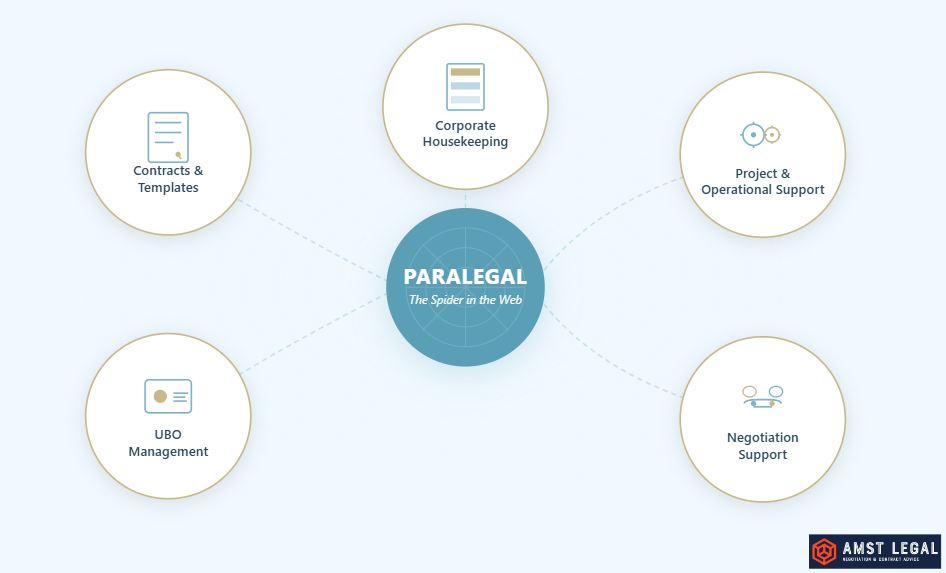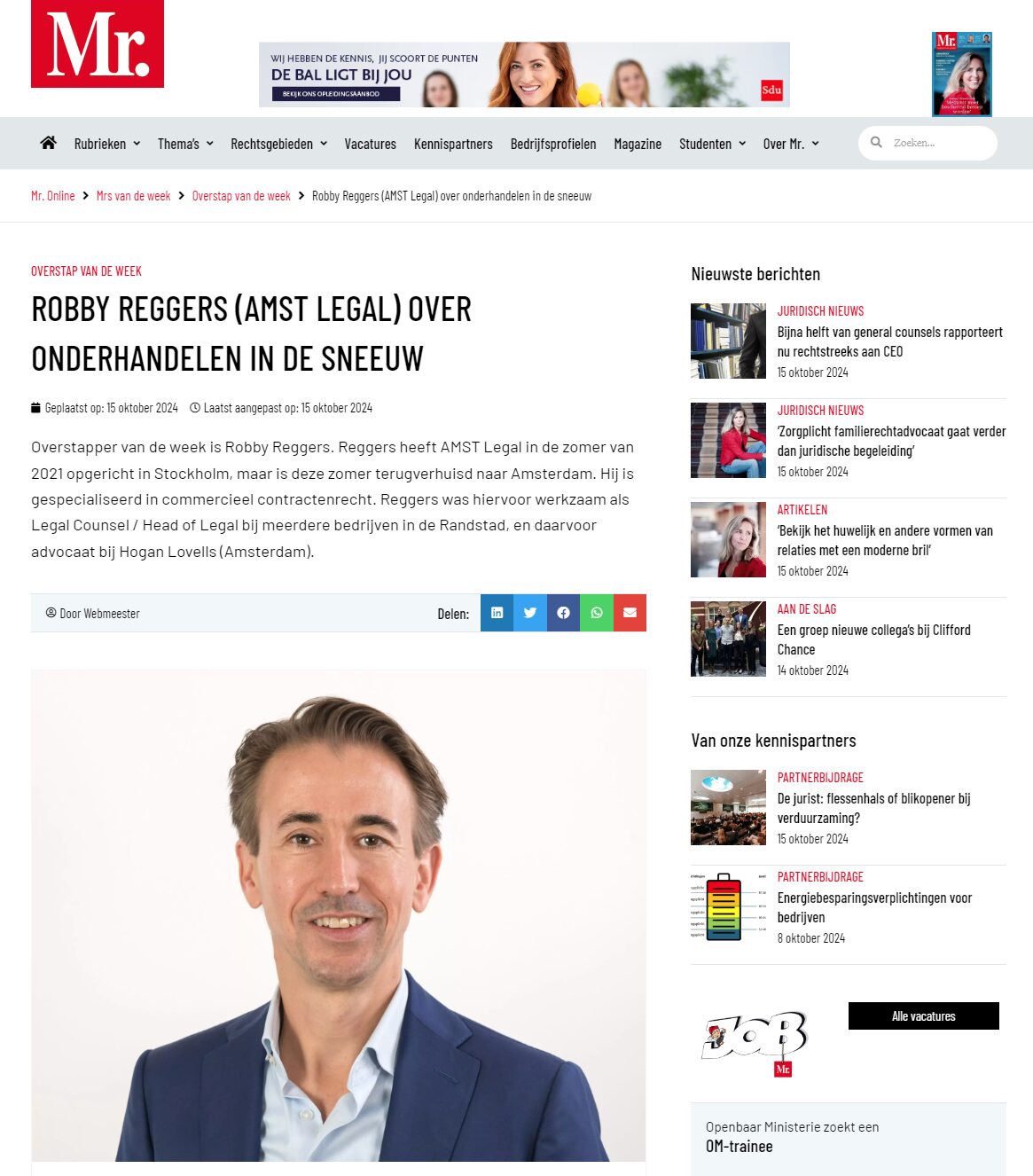
Introducing Paralegal Services – What is a paralegal and why do you need one?
What exactly does a paralegal do? How are paralegals different from lawyers or legal counsels? If you run a business, lead a sales or procurement team, or manage in-house legal operations, understanding the answer can save you both time and money. In the legal profession, there are many different roles. Most people are only familiar with lawyers and legal counsels. However, there is an additional role that everyone should know about. It is an important profession that is often misunderstood: paralegals.
Although the role is gaining in popularity, there are many misconceptions or questions what they do exactly and which paralegal jobs are most popular. Common questions we also hear are: “Shouldn’t we refer to the role as paralegal legal assistant or paralegal assistant”? Also: “Should I hire a paralegal or lawyer for this” or “Where can a paralegal help me here”. As we often see and hear a need for them, we wrote this article to answer these questions. We will also cover the difference is between a paralegal vs lawyer or legal counsel. Hopefully, this will clear any confusion you might have about what paralegals are and what they can do.
“Paralegal services involve trained professionals who handle delegated legal tasks such as contracts, compliance and corporate records, allowing lawyers and business teams to focus on strategy.”
What we will cover
- What a paralegal is,
- The role of paralegals in business and legal operations
- Real-world examples of the benefits of paralegal services for business and legal stakeholders,
- Common challenges when companies overlook paralegal support, and
- Why paralegals are critical in modern business environments.
What is a paralegal?
The role of Paralegals in Business and Legal Teams
The easiest way to explain what a paralegal does is to describe the roles they combine. In practice, paralegal services merge elements of several professions and skills of administrative assistants, junior / mid level legal counsels and accounting assistants. Thus, the different roles are usually as follows:
- Administrative assistance: ensuring documents or corporate records like Corporate Housekeeping, Powers of Attorney and UBO filings are accurate and accessible. We have seen that paralegals are perfect additions to the legal team to be the person responsible for these documents. For further information about UBO, see our article “Ultimate Beneficial Ownership (UBO) Explained – What is it and How to Create a Process That Works” here).
- Legal secretary: A legal secretary focuses on organizing case files, preparing correspondence, formatting legal documents, scheduling meetings, and coordinating filings for lawyers or partners in a law firm.. Paralegals build on this role with deeper legal knowledge and greater autonomy.
- Junior legal counsel: in our practice, this means drafting contracts, proof-reading agreements, conducting legal research, rolling out templates (like order forms and terms and conditions) and flagging potential risks for lawyers to address. Generally speaking, junior legal counsel can basically do all tasks that the other legal counsels in the legal team are responsible for.
- Accounting assistant: Many paralegals also support the financial and compliance functions that intersect with legal work. This may include tracking payment obligations, monitoring contract deadlines, supporting bookkeeping related to legal spend, and managing compliance tasks that influence financial reporting or audit preparation.
However, the true value of a paralegal lies in how these functions come together. Paralegals often describe themselves as “the spider in the web,” coordinating across departments to create structure and efficiency. This image captures their central role in connecting legal, commercial, and financial processes.

Paralegal Services in Europe
In Europe, paralegal services are less visible outside legal circles, but their importance is growing. Many different stakeholders can benefit with a paralegal on the team, which we will elaborate on in the following. Although they do play a crucial role, lawmakers in the Netherlands and Sweden have not established a general definition or common description of the role. In the United Kingdom however, the National Association of Licensed Paralegals (NALP) define a paralegal as:
“A person who is educated and trained to perform legal tasks but who is not a qualified solicitor or barrister.”
NALP defines the role of paralegals in a way that also fits the Netherlands and Sweden, as they do assist lawyers and legal counsel with legal tasks. However, the role can be broader than that and most paralegals in the Netherlands and Sweden have higher education backgrounds.
See NALP’s website and further information here.
Education in the Netherlands and Sweden
In most European countries, “paralegal” is not a protected title, which means professionals can enter the field through different routes. Still, most have legal training that equips them for corporate and law firm roles.
In the Netherlands, it is common to study law at various level, from college to university. Each route provides varying levels of legal knowledge and practical skills, but all can lead to roles as juridisch medewerker (legal assistant). As we have seen in many corporates, these roles are a great stepping stone to advance in their career and grow to other roles in the company.
In Sweden, common paths include starting as a juristassistent after upper secondary school, completing a two-year higher vocational program with internships, or studying law at university while gaining work experience.
As a result, both Dutch and Swedish paralegals bring a mix of academic training and practical skills, making them adaptable resources for sales teams, procurement managers, and in-house counsel.
Paralegal Services in the USA
In the US, “paralegal” is a well-known profession and formal training has been on-going since late 1960s when they were acknowledged by the American Bar Association (ABA). The contemporary definition of a paralegal according to the ABA is as follows:
“A paralegal is a person, qualified by education, training, or work experience who is employed or retained by a lawyer, law office, corporation, governmental agency or other entity and who performs specifically delegated substantive legal work for which a lawyer is responsible”.
See the ABA’s website here and further information of the historical background here.
In other words, a paralegal in the US is working with law matters delegated by the responsible lawyer. Although the U.S. lacks nationwide regulation, California sets specific requirements for paralegals.
See the American Association for Paralegal Education’s website here and the National Federation of Paralegal Associations’ website here for more information.
What Paralegal Services contribute with to Business and Legal teams
Why Paralegals are Essential
They provide much more than what an administrative assistant can due to the bachelor degree of law obtained. Taking advantage of paralegal services leads to structured legal support that bridges the gap between routine documentation and high-level legal support. That is why it is very common to see many of them working at law firms or legal teams (inhouse legal). So, when considering hiring a lawyer or legal counsel, keep paralegals in mind too.
Why you should keep paralegals services in mind when considering legal resources, there are two main reasons. Firstly, it strains legal fees. Either by having the paralegal assist your legal counsel, relieving them of costly work or by letting the paralegal do preparatory legal work that does not require a legal counsel or lawyer. Secondly, using a paralegal streamlines processes (with sales, procurement, compliance etc.) which creates possibility for higher revenue while staying legally protected.
What to Expect from Paralegal Services
To create an even clearer picture of how paralegal services can contribute to your company’s or law firm’s day-to-day work, let us dive into the specifics. Generally, the limitations of what paralegals can do are vague from a legal point of view due to the lack of regulation. Naturally, certain tasks are only possible for lawyers to do, but that does not mean that they cannot assist in the beginning or do a quick check towards the end.
In sum, they typically handle the time-consuming preparatory work for lawyers or legal counsels. Responsibilities for paralegals cover a range of documents that sit at the foundation of every business.
8 examples Where to Use Paralegals
To name a few things that is part of the work of paralegals, it normally includes:
- making lists of e.g., debtors and creditors, stakeholders, competitors etc,
- structuring and proof-reading contracts and documents like order forms, NDA’s, power of attorney’s, employment contracts, terms and conditions, routine supplier or customer agreements etc,
- preparing, drafting and filing legal and corporate documents (i.e. corporate housekeeping and UBO),
- sorting and value evidence for clients,
- conducting legal research on relevant topics,
- drafting contract templates and client instructions and/or information,
- rolling out new order forms, terms and conditions, templates and information to clients,
- assisting in compliance matters (like data privacy, data protection, trade control etc).
While lawyers or legal counsel naturally should review some of these documents in the end, paralegals can do the initial check. By doing this, they can provide a bridge between the different contract processes of a company, At the same time, this brings structure and lets the lawyer or legal counsel focus on complex questions. This opens possibilities and streamlined yet cost-reduced processes. In short, paralegals are a great complement for legal teams at companies of varying sizes.
Advantages of hiring a paralegal
Practical Benefits
We have discussed what a paralegal is and examples of what can be expected from their services, but now we will pinpoint exactly how your business or law firm can benefit from hiring such a legal professional. To highlight the various benefits, we will delve into this below.
Business impact: speed, clarity, cost- and process efficiency
Companies often struggle to balance commercial speed with risk management. Taking advantage of paralegal services and integrating that into company operations benefit by bridging this gap. This enables faster contract cycles, better communication between departments and lower overall legal costs. In turn, sales and procurement teams no longer have to wait for routine legal tasks to be completed by an expensive senior counsel. Instead, they receive timely cheaper support from a paralegal that keeps business moving, without sparing on up-to-date legal aspects and compliance.
A Few Examples of Advantages in Business
In business, this approach reduces:
- missed compliance deadlines that slow funding,
- deal delays that frustrate sales cycles and
- inconsistent terms that increase supplier risk.
This structured process reduces likelihood of later disputes and streamlined processes since terms are consistently applied and properly documented.ior legal counsel focus on complex questions, opening possibilities and streamlined yet cost-reduced processes.
In addition to hiring a paralegal, businesses can heavily reduce their contract processes by applying our tips of 10 ways to improve your contract processes. Access some of our published articles on this topic below:
- here to know why you should focus on improving your contract templates,
- here to get tips on how to manage your contract templates,
- here to see the benefits of strong collaboration between legal and other departments, and
- here to learn why it is crucial to let your legal counsel lead the work of improving contract templates.
Furthermore, the benefits of paralegal services are not limited to improved business processes and results. It is also beneficial in terms of legal impact and aid for the legal counsel in charge.
Legal impact: improved structure, better scalability
From a legal perspective, paralegal services reduce the likelihood of errors and disputes as they go into the detail of the documentation and contracts. In turn, records are complete and consistent which helps companies scale up with confidence. When expanding into new markets or preparing for acquisition, well-maintained documentation reduces risk and positions the company as a professional, trustworthy partner. At the same time, when routine legal work is relieved from the legal counsel, they can focus on the legally complex contracts. Allowing this creates the ideal situation for successful legal and business outcomes.
Practical Challenges when Paralegal Support is Missing
Without a paralegal, companies frequently face avoidable bottlenecks. For example, contract approvals may stall because no one organizes the drafts or tracks deadlines. Corporate housekeeping tasks such as annual shareholder resolutions can be overlooked, creating compliance risks and delay. In many cases, sales teams resort to reusing outdated templates or making ad hoc edits, which leads to inconsistencies and legal vulnerabilities. This lack of structure increases costs in the long run.
Opportunities when handled well
When businesses integrate paralegal services into their workflow, they gain both speed and reliability. Contracts move faster through review cycles, because then the right version is used, signatures are tracked, and key terms are flagged for lawyer/in-house counsel input only when necessary. In addition, corporate records remain current, so audits, compliance checks, or investor requests can be answered immediately.
The result is a smoother collaboration between business and legal stakeholders. Procurement managers know that terms are consistent, CFOs trust that filings are in order, and founders gain the confidence that their company is legally prepared for growth or sales increase.
Key takeaways
- Paralegals provide essential legal support that saves time and cost for businesses of all sizes.
- Companies without paralegal support face bottlenecks, inconsistent contracts, and compliance risks.
- Integrating paralegal services with general-counsel services creates smoother processes for sales, procurement, and legal teams.
- Paralegal services are beneficial for companies within any industry and law firms.
- Businesses that invest in paralegal support gain efficiency, clarity, and legal readiness for growth and sales increase.
Conclusion & next steps
Paralegal services are no longer optional for growing businesses. They are a practical solution to reduce costs, improve compliance, and ensure contracts move through the pipeline without delay. At the same time, they are a great investment to ensure proper assistance to your in-house counsel. Whether your company is closing tech deals, managing supplier relationships, or preparing for an investment, paralegals provide the structured legal support you need.
At AMST Legal, we combine senior legal counsel with skilled paralegal services, offering clients the right mix of strategy and execution. Our work spans individual projects as well as interim arrangements with set hours each week, giving you flexibility and reliability. We offer flexible paralegal services and senior legal counsel services in Stockholm, Sweden and Amsterdam, the Netherlands.
👉 Visit amstlegal.com to learn more or book a consultation today here or email lowa@amstlegal.com.

In the Press: A Conversation with Robby Reggers (Nederlands)
Artikel Mr. Online
Op 15 oktober heeft mr-online (see (link) een interview met Robby Reggers gepubliceerd. Mr. is hét online platform voor juristen, dat ook en maandelijks tijdschrift uitbrengt. Mr. bericht over actuele zaken in de juridische wereld en belicht en becommentarieert deze vanuit een onafhankelijke positie. Mr. richt zich op alle in Nederland actieve juristen en WO-rechtenstudenten.
Onderwerpen van het Artikel
Het is fantastisch dat Robby de kans kreeg om meer te vertellen over zijn ervaringen in Zweden (en Scandinavië). In dit Interview vertelt Robby Reggers over de volgende onderwerpen:
- Terugkeer naar Nederland en plannen voor AMST Legal (naast een kantoor in Zweden nu ook op de ZuidAs in Amsterdam).
- Uitdagingen en kansen bij het opzetten van een eigen kantoor in Zweden.
- Cultuurverschillen tussen Zweden en Nederland.
- Grootste valkuilen bij onderhandelingen en hoe deze te vermijden.
- Tips voor juristen en advocaten die internationaal willen werken.
- Ervaringen met onderhandelen in andere culturen.
Overstapper van de week
Overstapper van de week is Robby Reggers. Reggers heeft AMST Legal in de zomer van 2021 opgericht in Stockholm, maar is deze zomer terugverhuisd naar Amsterdam. Hij is gespecialiseerd in commercieel contractenrecht. Reggers was hiervoor werkzaam als Legal Counsel / Head of Legal bij meerdere bedrijven in de Randstad, en daarvoor advocaat bij Hogan Lovells (Amsterdam). Zie hierbij het ‘Interview met Robby Reggers (AMST Legal) over Onderhandelen in Scandinavië’.
Welkom terug in Nederland! Waarom bent u teruggekomen en wat zijn uw plannen en doelen voor AMST Legal in Nederland?
Dankjewel! Wij zijn als familie teruggekomen naar Nederland door het werk van mijn vrouw. Ook merkten we dat het door de groei van AMST Legal, met veel Nederlandse klanten, de beste keuze was. Het doel is om AMST Legal verder uit te breiden in Stockholm, maar vooral ook in Amsterdam. Dit lijkt zeker mogelijk omdat er veel vraag is naar onze specialiteit: flexibel juridisch advies over het opstellen en onderhandelen van commerciële contracten. Vooral onze expertise met betrekking tot procesverbetering door standaarden, inclusief het gebruik van Legal Tech & AI, is erg in trek.
Wat waren de belangrijkste uitdagingen en kansen die u tegenkwam bij het verhuizen naar Zweden en het opzetten van uw eigen kantoor daar?
De belangrijkste kans die we zagen was de ongelooflijk fascinerende wereld van Scandinavië die voor ons openging. Fantastisch hoe zo een groot en relatief onbekend deel van Europa zo interessant kan zijn. Naast Zweden, hebben we nu klanten van Noorwegen en Finland tot in de Baltische staten. Dat zijn toch echt landen waar ik nooit had verwacht om zaken te doen. Ik ben nog aan het wachten op mijn eerste vergadering in de poolcirkel, maar dat gaat vast lukken.
De belangrijkste uitdagingen waren zonder twijfel het opzetten van een eigen onderneming in Zweden. Het is al ingewikkeld om in Nederland een onderneming op te zetten, laat staan in het buitenland.
Wat waren in uw werk de meest opmerkelijke cultuurverschillen tussen Zweden en Nederland, en kunt u die toelichten?
Zweden zijn erg conflictmijdend, dus dat is wel een sterk cultuurverschil waar je rekening mee moet houden tijdens werken met collega’s, onderhandelen of bij het adviseren. Daarnaast is het belangrijk om te beseffen dat relaties erg belangrijk zijn om zaken te kunnen doen en dat er focus ligt op consensus bij beslissingen nemen. Dit betekent dat processen wel langzamer gaan dan in Nederland.
Wat me het meest verbaasde was dat de Zweden – zoals in Frankrijk – een cultuur hebben van uitgebreid lunchen tijdens de middag. Er zijn veel betaalbare lunch-aanbiedingen of buffetten in de stad waar advocaten, accountants samen met de bouwvakkers lunchen – echt super. Het is ook heel normaal om bij -15 even buiten te gaan wandelen in de sneeuw om te overleggen met een klant of collega.
U biedt ook onderhandelingscursussen aan. Wat zijn volgens u de grootste valkuilen bij onderhandelingen en hoe kunnen professionals deze vermijden?
De grootste valkuilen in onderhandelingen zijn meestal gebrek aan voorbereiding en slecht luisteren en communiceren. Om dit te vermijden benadrukken we vooral in onze trainingen hoe je 1. beter voorbereid onderhandelingen kunt ingaan door deze te verdelen in drie verschillende fases en 2. met kwaliteitsvragen en empathisch luisteren een beter resultaat kan halen bij onderhandelingen – en je niet altijd met een compromis hoeft te komen. Het gaat erom dat je de tegenpartij beter begrijpt.
Wat is uw tip van de week voor juristen en advocaten die overwegen om internationaal te werken of hun eigen kantoor te starten in het buitenland?
Zo vroeg en goed mogelijk de lokale taal leren maakt een enorm verschil in de mogelijkheid tot het vinden van cliënten in het buitenland. Klinkt erg voor de hand liggend, maar het schiet er toch bij de meeste mensen in (inclusief mezelf).
Daarnaast is het belangrijk om een lokaal netwerk op te bouwen. In dat kader heb ik een erg fijne samenwerking gehad met Nederlandse ondernemingsclubs – ik vind bijvoorbeeld de Nederlandse Kamer van Koophandel in Zweden super – en de Nederlandse ambassade. Zorg ook dat je naar zo veel mogelijk bijeenkomsten en congressen gaat. Dit heeft mij enorm geholpen bij het contact leggen met lokale en internationale klanten die banden hebben met Zweden en actief zijn in Scandinavië.
Conclusie
Robby heeft in dit interview kunnen vertellen over zijn ervaringen met het wonen, werken en opzetten van een nieuw bedrijf in het buitenland. bij vragen of gewoon een gesprek over deze ervaring, kunnen jullie altijd contact opnemen met Robby via +31 6 50608964.
U kan ook altijd Robby contacteren voor trainingen (teams of professionals) hoe beter te onderhandelen in internationale context.

Contract Negotiations: How to Avoid Negative Reactions in Redlines and Mark-ups
𝗤𝘂𝗶𝗰𝗸 𝗖𝗼𝗻𝘁𝗿𝗮𝗰𝘁 𝗡𝗲𝗴𝗼𝘁𝗶𝗮𝘁𝗶𝗼𝗻 𝗧𝗶𝗽 𝗼𝗳 𝘁𝗵𝗲 𝗗𝗮𝘆: When reacting to a comment or suggested wording by a counterparty that is commenting on your contract, 𝘢𝘷𝘰𝘪𝘥 using negative language like:
“Adding this wording in the Article is incorrect because it has already been covered in Art. 12.”
Instead, try saying:
“Thank you for your comment. I agree with your addition. Please note that we have already covered this in Art. 12.”
Additionally, for important subjects, you can add:
“If you do not agree with this wording, please let me know”; and/or
“Please let me know if you would like to discuss this topic during our next meeting”.
As we know, during contract negotiations, it’s important to maintain a cooperative relationship with the other party. Remember, the counterparty is also just doing their job and you are working together to reach a mutually advantageous outcome.
By using positive language in your reactions to comments, you can help keep negotiations running smoothly and maintain a good relationship with the counterparty.
For a bit more background on The Importance of a Relationship in Negotiations, please see the following article on the Harvard website.
See our original post on this subject on LinkedIn
#ContractNegotiations #HowtoNegotiateBetter #ContractLaw #AMSTLegal #contracts #negotiation #negotiationskills #relationshipbuilding

Legal in the Lead when improving Contract Templates
Legal should be in the lead when creating contract Templates, but always with the help of all other teams.

Contract Negotiations: How To Avoid Negotiation Peaks? Part 5
As we approach the end of Q3, this week a short message as the pressure is on to review, negotiate and close contracts before end of next week!
To make the end of the Quarter more manageable, lay the groundwork:
1. Early Preparaation and Prioritization
2. Communication & Cooperation
3. Standard Templates
4. Implementation of Legal Tech
However, at the end of the Quarter it will always be busier than normal.
𝗙𝗼𝘂𝗿 𝘁𝗶𝗽𝘀 𝗳𝗼𝗿 𝘆𝗼𝘂𝗿 𝗹𝗮𝘀𝘁 𝘄𝗲𝗲𝗸:
* Prioritize: Focus on high volume and strategic deals that are nearing closure and absolutely need to close this month.
Ask yourself: Is the very important contract you are working on now actually closing next week, or should you pause this deal for now and pick it up again in Q4 because it is actually a Q4 deal? Focus on Q3 deals only when busy.
Check: what are the Top priorities of the company & Sales department? Are you working on the right deals?
* Clear Communication:Keep open and transparent communication with your customers and internal teams. Confirm their (timing and process) needs, address any concerns and reiterate the urgency to reach a final agreement.
Streamline the contract process by collaborating closely with internal teams. Set daily meetings where necessary with clear goals for each day.
* Team Collaboration: The management, sales, legal, and procurement colleagues have to collaborate seamlessly to resolve any last-minute hurdles. Cross-functional teamwork is key to overcoming last obstacles or escalation matters
Avoid solo working on your very complicated deal, but collaborate with internal and external teams to ensure maximum efficiency and alignment to avoid delays.
* Deadline Management: Keep a close eye on deadlines, review the full list of contracts to be signed and requirements (contracts, documents, approvals, etc) and plan a few days ahead – leave room for error. Missing a critical date, signature or document in the last week of the quarter can be costly.
Closing deals in the final week of Q3 is all about focus, prioritization, communication and teamwork. Let’s make this week count and finish the quarter with success!

Contract Negotiations: How To Avoid Negotiation Peaks? Part 4
In the run up to Quarter 3 end (30th of Sept.), I advise you to send an email out today to your Sales, Partner & Procurement colleagues informing them that in the next two weeks, you will only pick up contracts that are:
* already ongoing;
* truly urgent; and
* need to be signed before the end of this month / end of Quarter (3).
Any deviations from this rule should get a green light from Senior Management.
Why?
The above is a pro-active step to manage your workload and working towards an efficient Legal department.
By emphasizing urgency and advanced planning, you can alleviate the end-of-quarter rush, enabling Legal to focus on what genuinely demands attention.
From experience I am aware that it is not an easy sell to the organisation, but , but trust the process. Once the wider organization realizes this is the gold standard for the legal team, they will (most of the time):
(i) initiate timely discussions, and
(ii) forward their inquiries and feedback well in advance.
I have deployed this strategy previously and while it takes a while for teams to get used to, the positive change is undeniable after 2-3 Quarters.
It ensures that your team’s time and resources are directed toward the most critical and time-sensitive matters. This approach also prevents (to the extent possible) that the teams are working on less urgent tasks, allowing for better productivity and focus.
Next Steps before you hit send:
1. Inform the sales, procurement, partnerships teams during your regular sync-up meetings about this communication and approach of the Legal department.
2. Align this approach with your manager and stakeholders or C-suite overseeing the sales, procurement, partnerships teams.
Good luck! Let me know if it also worked for you or if you have questions / comments.

Contract Negotiations: How To Avoid Negotiation Peaks? Part 3
𝗩𝗲𝗻𝗱𝗼𝗿 𝗖𝗼𝗻𝘁𝗿𝗮𝗰𝘁𝘀
Picture the moment of buying new software, finalizing the lease on that dream workspace or formalizing your agreement with the new accountant via engagement letters. These are not just signatures or digital approvals of external contractual terms, they are important business decisions. Welcome to the world of vendor contracts!
Building on our previous discussion how to negotiate your 𝘰𝘸𝘯 𝘤𝘰𝘯𝘵𝘳𝘢𝘤𝘵𝘴 like customer contracts (Part 2), let’s focus now on contract of other parties.
𝗦𝘁𝗮𝗿𝘁𝗶𝗻𝗴 𝗽𝗼𝗶𝗻𝘁
One key principle we always advocate for: be cautious and hesitant to approve external template vendor contracts (referred to as Customer Paper) replacing your own template customer contract. Even though it is advised that large companies have their own template vendor contract for their vendors, only approve the use of such templates in exceptional and pre-approved cases. This will not only prevent delays, protect your business interests but also streamlines the negotiation process.
𝗠𝗮𝗶𝗻 𝗶𝗻𝘃𝗼𝗹𝘃𝗲𝗱 𝘁𝗲𝗮𝗺𝘀
𝟭. 𝗠𝗮𝗻𝗮𝗴𝗲𝗺𝗲𝗻𝘁:
Roles:
· Strategic direction
· Alignment other teams. ´If the Sales Team wants to buy this software tool, let’s involve Procurement, Finance and IT to check the suitability of the tool´.
· Final decision
* Best practice:
– Keep overview of vendors to align with company’s objectives.
– Work on communication between teams, especially for large vendor contracts.
𝟮. 𝗣𝗿𝗼𝗰𝘂𝗿𝗲𝗺𝗲𝗻𝘁: Acting as the bridge between your company and the external vendors, having the overview and responsibility for all vendor contracts.
Roles:
· Budget & Pricing; Assess value and benefits of vendor contracts.
· Relationship building and primary vendor point of contact
· Negotiating contracts.
· Contract compliance with company policies/procedures
* Best practice:
– Inform all teams early of anticipated engagements with vendors.
– Keep the management updated with vendor list
– Involve the legal team 𝗲𝗮𝗿𝗹𝘆 (avoid end of quarter requests) to review contracts with clear timelines.
𝟯. 𝗟𝗲𝗴𝗮𝗹.
Roles:
· Review, advice and negotiate contracts
· Streamline process
· For large companies: create vendor templates
· Create questionnaire for all vendors (create with Compliance / Data Security Team)
* Best practice:
– Create a vendor questionnaire
– Stay proactive (not reactive) to avoid review of vendor contracts in peak periods
– Improve communication between legal, procurement and other teams to avoid delays and last minute reviews.
Prioritize vendor contracts for Quarter start periods. handling contracts based on $value and potential impact.

How To Avoid Peaks in Negotiation Cycles by Improving Team Collaboration
1. Introduction
Working towards an optimized negotiation process is not only a legal matter but requires effective collaboration between various teams. In my experience, the teams highlighted below have the most important role in negotiation cycles.
The general rule to involve all teams in your contract template creation and contract negotiations will always apply. As Legal is in the middle of these processes, we have written this series from the point of view of the Legal department.
Let’s dig deeper into the roles of the different teams involved in negotiating your own contracts.
2. 𝗠𝗮𝗻𝗮𝗴𝗲𝗺𝗲𝗻𝘁
Next to a focus on the strategic vision of the company, the management will encourage teams to sign as many customer contracts as possible. It will especially crucial for the management to have a seamless process with minimal involvement from management, except where agreed.
Main roles
In contract negotiation, the roles of the company’s management will be:
- · Strategic Vision
- · Risk Management
- · Stakeholder Alignment
- · Escalations / final decisions
Best practice: Establish a robust structure that defines Management’s role and involvement in decision-making processes. Explore and discuss refinement of contract processes and agree on key priorities.
3. Commercial Team
With this we mean for example Sales & Account Managers, Business Development Managers, Partnership Teams. As a sprinter nearing the finish line, the Commercial Team will race to close deals at the end of each quarter. Smoother processes will mean better results so Commercial Teams are usually more than willing to work towards improvements.
Main Roles:
In contract negotiation, the roles of the company’s commercial team will be:
- · Overall Overview and Responsibility for customer contracts
- · Relationship building / primary point of contact
- · Getting the deal done
- · Stakeholder Alignment
Early involvement and cooperation with other teams is imperative for Sales to avoid bottlenecks & peaks. In the cooperation with Legal, focus on (i) Setting Priorities, (ii) Contract Template Training and (iii) when & how to involve Legal.
4. 𝗟𝗲𝗴𝗮𝗹
In contract negotiations, the legal team navigates all legal advice and negotiations from a strategic point of view, with a goal to improve processes and reduce risks for the company.
Main roles:
In contract negotiation, the roles of the company’s legal team will be:
- · Contract Advice, Negotiation and Drafting
- · Risk Management of the company
- · Creation of contract templates / playbooks and contract process improvement
Best practice: Legal shines in drafting, advising and negotiation of contracts. Do not create gridlocks by making them the point person for each negotiation. Strategize with Sales when Legal should step in, which should mainly be for large or strategic customer contracts.
Conclusion
By carefully dividing roles and collaborating closely between teams, we are able to work on improving contract & negotiation processes. This also includes working better together to avoid end-of-quarter spikes before the holidays.
In our other articles about this topic, see 1, 2, 3 and 4 we dive deeper on the ways to improve the communication and collaboration between these teams.

Contract Negotiatons: How to Avoid Negotiation Peaks? Part 1
Negotiating commercial contracts is always a daunting task, but is particularly complicated at the end of Quarter. We have written a series of tips on how to avoid these negotiation peaks, using my experience gained on this topic since 2004, as I have found that now a great time to start preparing for the end of Q3 and especially for the highest peak of the year (end of Q4).
If we all embrace the goal of reaching a steady negotiation rhythm, we are able to unlock benefits like improved decision making, streamlined processes, more joy at work and stronger relationships. Replace rushed contract negotiations & discussions with a strategic plan that allows for efficient and optimal contract negotiations.
As Commercial Contracting Experts, we focus on the following two scenario’s:
Scenario 1: negotiating your own contracts with buyers of your Products & Services: Customer Contracts.
-Teams involved: Sales, Account Management, Legal, Finance, Management, etc.
Scenario 1: negotiating contract of other companies to buy their products: Vendor & Supplier Contracts.
-Teams involved: Procurement, Finance, Facility, IT, Legal, Management, etc.
Top 10 common Commercial Contracts
– Confidentiality Agreement (NDA)
– Order Form
– Master Services Agreement (MSA)
– General Terms & Conditions (GT&C)
– License Agreement
– Framework Agreement
– Partner Agreement (Reseller, Distribution, Incentive Agreement)
– Service Level Agreements (SLA)
– Statement of Work (SOW)
– Data Privacy Agreement (DPA)
First Tip: start your preparation & planning and list your priorities now.
Are the teams your work with aware that the contracts you are working on need to be signed soon – particulary before end of Q3 or Q4??
Contact your team members this week to inform them of any upcoming contract negotiations.
Four Critical Factors: The following four Critical Factors will prepare you to work towards a steady negotiation cycle:
1. Early Preparation, Planning and Prioritization
2. Communication & Cooperation
3. Standard Templates & Procedures.
4. Implement Legal Tech & Digital Solutions
Bonus: specific actions for the last weeks of each quarter.
In the next posts in this series we will provide you with the specifics of the four Critical Factors and share practical tips for the teams involved, especially Legal, Sales, Procurement and Management.
